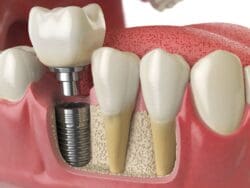Both dental implants and dentures are common ways to replace missing teeth, but how do you know which is best for you? It’s important to talk to your dentist, who can check your needs and guide you toward the right choice. Dr. Vijay Patel from Claremont Dental Institute explains the differences between implants and dentures.

Dentures Vs. Dental Implants
Dental implants are often preferred because they look and feel more natural and help keep your jawbone healthy. However, they can be more expensive and take longer to heal. Dentures cost less upfront and may be a better option for those missing several teeth or not suited for implants.
Dentures
Dentures are usually used to replace a full row of missing teeth. They have a base made of resin and metal, with teeth made of ceramic or plastic. One benefit of dentures is that you get them faster, and they cost less upfront than implants.
However, dentures may cost more over time. Without teeth, your jawbone starts to shrink. Dentures don’t stop this, so their fit will change as the bone shrinks, which can cause pain and irritation. To keep them fitting right, they’ll need to be adjusted or replaced.
Dentures give back about 30-40% of your normal bite function, so you may need to avoid certain foods. They are also bulkier than implants and can take time to get used to. You’ll need adhesive to keep them in place, but they may still slip or move when talking or eating. Dentures also require more care, like cleaning and soaking them every night.
Dental Implants
Dental implants have three main parts: a titanium post placed in the jawbone, an abutment that connects to the post, and a dental crown or bridge as the final restoration. While implants cost more upfront, they prevent future costs since they stop jawbone shrinkage by replacing the tooth root. In some cases, they can even reverse bone loss. The post bonds with the jawbone, providing strong support.
Implants take 3-6 months to heal after the post is placed, as it needs time to fuse with the jawbone. Once healed, implants give back 100% of your bite function, allowing you to eat anything. They won’t slip or need adhesive.
Implants look and feel just like real teeth. You can brush, floss, and visit the dentist as usual. The right choice depends on your oral health, budget, and lifestyle.
Cost Comparison
Dentures usually cost less upfront but may need to be replaced every 5-10 years. Implants cost more at first but last much longer. Over time, implants can be a better deal. Insurance coverage for both varies. Some plans might help with dentures, while others may cover part of the cost for implants. It’s important to check with your insurance provider.
Maintenance
Dentures need daily cleaning and regular check-ups. You’ll need to brush them and soak them overnight. Implants also need good care, like brushing, flossing, and seeing the dentist regularly. However, implants require less day-to-day upkeep. If you don’t care for them properly, implants can lead to issues like gum disease or peri-implantitis. Both dentures and implants need a commitment to oral health.
Comfort and Fit
Dentures can feel bulky or uncomfortable, and they may slip, which can be embarrassing. Implants feel more natural and secure. They don’t have the bulk of dentures, making them more comfortable for most people. Implants stay in place, so you won’t have to worry about them slipping when you eat or talk.
Long-Term Health Effects
Dentures don’t stop bone loss in the jaw, which can lead to changes in your facial shape over time. Implants, on the other hand, keep the jawbone healthy by stimulating it, which helps maintain your facial structure. They often need to be adjusted as your gums and jawbone change, while implants stay stable and don’t need frequent adjustments.
Suitability
Dentures are a good choice for patients with weaker jawbones since they don’t need as much bone strength as implants. Implants need a strong, healthy jawbone, so not everyone can get them. Certain health issues, especially those affecting bone healing, may prevent someone from being a good candidate for implants. A full dental evaluation is needed to decide the best option.
Final Considerations
Choose dentures if you want a less costly, non-surgical option. Pick implants if you want something long-lasting and natural-feeling. Talk to our dentists to get advice tailored to your needs, and think about both your long-term dental health and your budget before making a decision.
